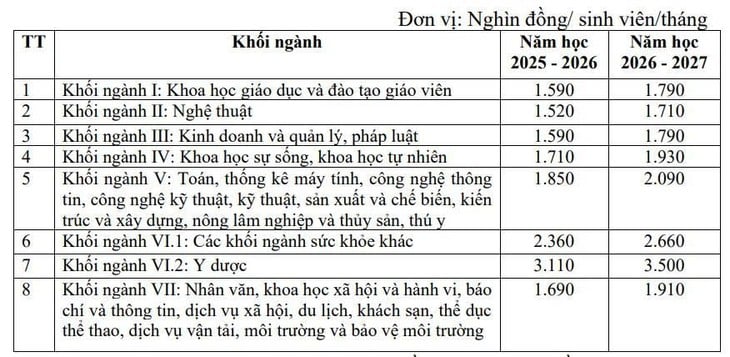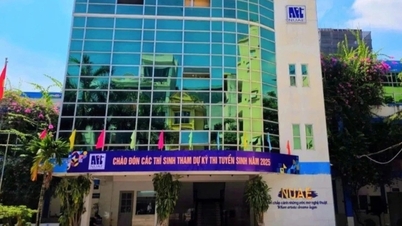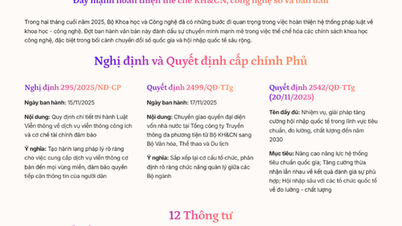
Tuition fees at universities have been increasing continuously over the years. Tuition fees are one of the factors that candidates consider when choosing a school that suits their family's financial capacity - Photo: TRAN HUYNH
The Ministry of Education and Training has just announced a new draft decree regulating the mechanism for collecting and managing tuition fees for educational institutions in the national education system and policies on tuition exemption and reduction, support for learning costs, and service prices in the field of education and training.
The new Decree will inherit the provisions of Decree No. 81/2021/ND-CP and update and supplement the provisions of the 2023 Law on Prices.
Principles for determining tuition fees
According to the draft, for public educational institutions, tuition fees are determined based on the principle of cost recovery, with reasonable accumulation according to the provisions of the Law on Prices and a roadmap for calculating sufficient costs appropriate to each level of education, socio -economic conditions of each residential area, consumer price index growth rate, and annual economic growth rate.
For training programs of public higher education institutions that meet the quality accreditation level of training programs according to the standards prescribed by the Ministry of Education and Training or meet the quality accreditation level of training programs according to international standards or equivalent, higher education institutions are allowed to self-determine the tuition fees of that program based on the economic and technical norms issued by the educational institution, and publicly explain to learners and society.
Private educational institutions have the right to proactively set tuition fees and prices for other services in the field of education and training (except for services priced by the State) to ensure cost recovery and reasonable accumulation according to the provisions of the Law on Prices.
Implement publicly in accordance with the law and be accountable to learners and society about tuition fees and service prices decided by themselves; explain the price components, roadmap, and tuition fee increase rate in the following years (not more than 15% for university training).
The highest tuition fee ceiling for medical and pharmaceutical universities
The Ministry of Education and Training proposes the tuition fee ceiling for public higher education institutions that are not self-sufficient in regular expenditure from the 2025-2026 school year onwards as follows:

From the 2027-2028 school year onwards, the tuition fee ceiling will be adjusted in accordance with people's ability to pay and socio-economic conditions, but must not exceed the consumer price index growth rate at the time of determining the tuition fee compared to the same period last year as announced by the competent state agency.
Public higher education institutions that cover their regular expenses: The tuition fee is determined to be a maximum of 2 times the tuition fee ceiling of institutions that are not self-sufficient in regular expenses.
Public higher education institutions that cover their own regular and investment expenses: The tuition fee is determined to be a maximum of 2.5 times the tuition fee ceiling of institutions that do not cover their own regular expenses.
For training programs of public higher education institutions that meet the quality accreditation level of training programs according to the standards prescribed by the Ministry of Education and Training or meet the quality accreditation level of training programs according to foreign standards or equivalent, higher education institutions shall base on the economic-technical norms or cost norms of each training industry and profession issued by the educational institution to decide on tuition fees; and shall make this public to learners and society.
In the case of online learning, higher education institutions determine tuition fees based on actual and reasonable costs incurred, up to a maximum of the school's tuition fees corresponding to each major.
University tuition fees calculated by credit and module
The tuition fee for a credit or module is determined based on the total tuition fee for the entire course by training group, profession, and the total number of credits or modules for the entire course according to the following formula:
Tuition fee for credits and modules = Total tuition fee for the entire course
Total credits, full course modules
Total tuition fee for the entire course = tuition fee per student/month x 10 months x number of school years, ensuring the principle that the total tuition fee according to credits of the training program is at most equal to the total tuition fee calculated by school year.
Source: https://tuoitre.vn/de-xuat-tang-hoc-phi-dai-hoc-theo-toc-do-tang-chi-so-gia-tieu-dung-20250703113615209.htm







![[Photo] Dan Mountain Ginseng, a precious gift from nature to Kinh Bac land](/_next/image?url=https%3A%2F%2Fvphoto.vietnam.vn%2Fthumb%2F1200x675%2Fvietnam%2Fresource%2FIMAGE%2F2025%2F11%2F30%2F1764493588163_ndo_br_anh-longform-jpg.webp&w=3840&q=75)



































































































Comment (0)